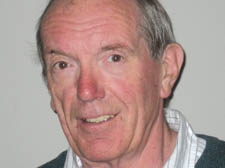|
|
 |
| |

Michael Boulter |
Sage observations on a clump of hedge parsley
A new book by Michael Boulter tells of the secret garden where Darwin penned the work that changed how we see the world, writes Ruth Gorb
Darwin’s Garden.
By Michael Boulter.
Constable £16.99 Order this book
IN 1842 Charles Darwin left London and went to live in Down House near Orpington in Kent. The man we see as one of history’s intellectual giants was running away. He was afraid of the London establishment and exhausted by city turmoil. He needed peace.
Michael Boulter’s remarkable new book is the story of the peace Darwin found at Down House, and in its garden.
It was five years since his extraordinary voyage on HMS Beagle. He had come back with a jumble of ideas but he felt he had to find evidence, a scientific explanation of how species evolved. It took almost 20 years, and the magic of the Down House garden, for him to find the courage to publish On the Origin of Species by Means of Natural Selection.
Next year is the 150th anniversary of its publication, and Michael Boulter’s book looks forward to its celebration. He uses Darwin’s garden, he says, as a vehicle for bringing Darwin up to date – “a way of showing that what Darwin gave us is still important. Even though he got the wrong end of the stick. Science is to do with experiments, and most experiments don’t work. Lots of Darwin’s came to nothing. Playing around with earthworms in the garden – it was mad, it made people laugh. Why did he do it? Because he was desperate to find the unit of inheritance.”
Boulter speaks with the authority of a scientist. He was professor of palaeobiology – “it means I’m into fossils” – at the University of East London, and he works now at the Natural History Museum. A long-time resident of Constantine Road in Hampstead, he was brought up in Leicester where it was expected that he would go to work in a hosiery factory. Enter an inspirational primary school teacher, Mr Reynolds. Seven-year-old Michael fell in love with a microscope. Science has been his life ever since.
His fascination with Darwin is combined with great compassion for this tormented soul. His fearfulness, says Boulter, was a result of his background. His grandfather a power-house of the Industrial Revolution, Erasmus Darwin, was a formidable presence in the family. Two of Charles’s uncles died in mysterious circumstances. His mother died when he was only eight, and his childhood was overshadowed by his father’s grief. His health, both physical and emotional, was fragile; whenever there was a crisis in his life, he became ill. A country garden, therefore, was as healing as it was inspirational for him.
He had the time and space to do his experiments, he had his reading and writing, and he had the freedom to enjoy correspondence with people all over the world and as a result there is an extraordinary record of Darwin’s discoveries.
His garden was his laboratory. He put fine netting over his primroses to keep insects away and so prevent pollination; he then compared them with the cowslips that grew outside the netting, and realised that that although they had similar flowers, they were two different species. He watched the orchids in his greenhouse making devious adaptations to attract bees. And there was his “Eureka moment” when he looked at some clumps of hedge parsley in two different environments and deduced that this could be how a new species was created – by moving to new territory.
Darwin died a happy man, says Boulter. During his last years the favourable reaction of scientists to his work gave him great satisfaction, and at last he felt confident.
His wife, Emma’s belief in God was at odds with her husband’s theories of evolution, but their marriage survived the difference. “He was not critical or aggressive towards religious precepts – indeed he saw a compatibility between religion and natural selection,” says Boulter.
Scientists since his death have tried to see biology as the same kind of science as chemistry and physics. You cannot measure Darwinian biology, says Michael Boulter.
“You can’t measure something that is constantly changing and unpredictable.
“Chaotic systems have a life of their own. Darwin had a hunch about how these things happen – weather, animals, plants, biology. Now we understand it a little. There is no need for religious fundamentalism, nor can we control the planet. We are brought up to believe that science will cure all our ills. A pipe dream. Nature is always ahead of science.”
Down House is not lived in any more but is in the care of English Heritage. It is open to visitors, and a gardener takes tours round Darwin’s garden which is planted with the varieties of plants he would have seen. There are still orchids and primroses in his greenhouse. And in the lane leading to the house, the hedge parsley still grows.
|
 |
|
 |
 |
|
 |
|



